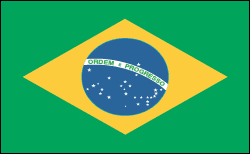Brazil History


The Lula Administration Oversees Economic and Social Reform
In Jan. 2003, Luiz Inácio Lula da Silva, a former trade union leader and factory worker widely known by the name Lula, became Brazil's first working-class president. As leader of Brazil's only Socialist party, the Workers' Party, Lula pledged to increase social services and improve the lot of the poor. But he also recognized that a distinctly nonsocialist program of fiscal austerity was needed to rescue the economy. The president's first major legislative success was a plan to reform the country's debt-ridden pension system, which operated under an annual $20 billion deficit. Civil servants staged massive strikes opposing this and other reforms. Although public debt and inflation remained a problem in 2004, Brazil's economy showed signs of growth and unemployment was down. Polls in Aug. 2004 demonstrated that the majority of Brazilians supported Lula's tough economic reform efforts. He combined his conservative fiscal policies with ambitious antipoverty programs, raising the country's minimum wage by 25% and introducing an ambitious social welfare program, Bolsa Familia, which has pulled 36 million people (20% of the population) out of deep poverty.
In 2005, an unfolding bribery scandal weakened Lula's administration and led to the resignation of several high government officials. Lula issued a televised apology in August, promising “drastic measures” to reform the political system. By the following year, his popularity had rebounded as he continued a successful balancing act between fiscal responsibility and a strong social welfare system. But after another corruption scandal surfaced right before the Oct. 2006 election, Lula won only 48.6% of the vote, forcing a runoff election on Oct. 29 in which Lula garnered 60.8% of the vote, retaining his office.
A new oil field, called Tupi, was discovered 16,000 feet below the ocean's floor in November 2007. Tupi will yield five to eight billion barrels of crude oil and natural gas, making it the largest oil field discovered since Kashagan Field in Kazakhstan in 2000.
After a three-year decline, the National Institute for Space Research reported that the deforestation rate in Brazil during 2008 increased 228% in 2007.
In Oct. 2009, Rio de Janeiro won the bid to host the 2016 Summer Olympics, becoming the first South American city to host the Games. Tokyo, Madrid, and Chicago, Ill. were the other finalists in the running.







